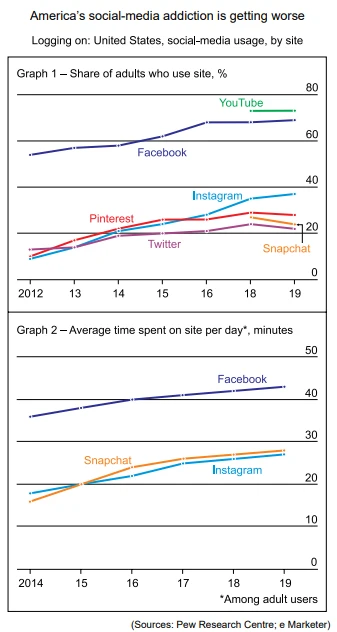Disciplina: Inglês 0 Curtidas
In the excerpt from the second paragraph “limiting - UNIFESP 2020
Leia o texto para responder a questão.

A survey in January and February 2019 from the Pew Research Centre, a think tank, found that 69% of American adults use Facebook; of these users, more than half visit the site “several times a day”. YouTube is even more popular, with 73% of adults saying they watch videos on the platform. For those aged 18 to 24, the figure is 90%. Instagram, a photo-sharing app, is used by 37% of adults. When Pew first conducted the survey in 2012, only a slim majority of Americans used Facebook. Fewer than one in ten had an Instagram account.
Americans are also spending more time than ever on social-media sites like Facebook. There is evidence that limiting such services might yield health benefits. A paper published last year by Melissa Hunt, Rachel Marx, Courtney Lipson and Jordyn Young, all of the University of Pennsylvania, found that limiting social-media usage to 10 minutes a day led to reductions in loneliness, depression, anxiety and fear. Another paper from 2014 identified a link between heavy social-media usage and depression, largely due to a “social comparison” phenomenon, whereby users compare themselves to others and come away with lower evaluations of themselves.
(www.economist.com, 08.08.2019. Adaptado.)
In the excerpt from the second paragraph “limiting such services might yield health benefits”, the underlined expression may be replaced, without meaning change, by
-
should impair.
-
can damage.
-
must deliver.
-
could produce.
-
will bring.
Solução
Alternativa Correta: D) could produce.
A alternativa D é a correta porque a expressão "might yield" sugere uma possibilidade, indicando que limitar o uso das mídias sociais poderia resultar em benefícios para a saúde. A substituição por "could produce" mantém essa mesma conotação de potencialidade, ou seja, algo que pode acontecer, mas não é garantido.
Além disso, as outras opções apresentam nuances diferentes que alteram o significado original. Por exemplo, "should impair" implica em uma expectativa negativa, enquanto "must deliver" e "will bring" indicam certeza, o que não está presente na expressão original.
Portanto, ao optar por "could produce", preserva-se a ideia de que os benefícios para a saúde são uma possibilidade, não uma certeza, alinhando-se perfeitamente ao contexto do texto e à intenção do autor. Essa escolha linguística é fundamental para a interpretação correta do trecho.
Institução: UNIFESP
Ano da Prova: 2020
Assuntos: Interpretação Textual em Inglês
Vídeo Sugerido: YouTube